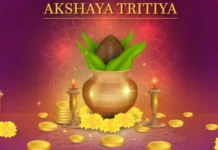Dhanteras: The Auspicious Festival of Wealth and Prosperity
When is Dhanteras 2022: History, significance, rituals and stories and all you need to know
Dhanteras, also known as Dhanatrayodashi, is a significant Hindu festival that marks the beginning of Diwali, the Festival of Lights. Celebrated on the thirteenth day (Trayodashi) of the dark fortnight (Krishna Paksha) in the Hindu calendar month of Ashvin (according to the amanta tradition) or Kartika (according to the purnimanta tradition), Dhanteras holds a special place in the hearts of millions of Indians. In this article, we’ll explore the history, traditions, and significance of Dhanteras.
The Legend of Dhanteras
Dhanteras is rooted in ancient legends. One popular story revolves around King Hima’s 16-year-old son, whose horoscope predicted a fatal snake bite on the fourth day of his marriage. To save her husband, the newlywed wife lit lamps and laid out her ornaments, gold, and silver coins.
She entertained him throughout the night with stories and songs, preventing him from falling asleep. When Yama, the god of death, appeared in serpent form, he was dazzled by the light and couldn’t enter the chamber. The prince’s life was saved, and Dhanteras was born as a celebration of this clever act.
Worship of Dhanvantari
Dhanteras is also the day when Dhanvantari, the god of Ayurveda, is worshipped. According to Hindu tradition, Dhanvantari emerged during the Samudra Manthana (churning of the ocean) with a pot of amrita, the nectar of immortality, in one hand and the sacred texts of Ayurveda in the other. He is considered the physician of the devas (gods).
Celebrations on Dhanteras
Dhanteras is a day of grand celebrations. In the evening, clay lamps (diyas) are lit to perform Lakshmi Puja, during which devotional songs are sung in praise of the goddess Lakshmi, the symbol of wealth and prosperity. Traditional sweets are offered as part of the ritual, and in Maharashtra, there’s a unique tradition of pounding dried coriander seeds with jaggery and offering the mixture as naivedhya.
Homes are thoroughly cleaned and whitewashed in preparation for Diwali. Rangoli designs and colorful lanterns adorn the entrance. Small footprints, made with rice flour and vermilion powder, are drawn all over the house to welcome the goddess Lakshmi.
On this auspicious day, Hindus consider it propitious to make new purchases, especially of gold or silver items and new utensils. It is believed that acquiring new “Dhan” (wealth) or precious metal items brings good luck. In modern times, Dhanteras is synonymous with buying gold, silver, and kitchenware. Many also invest in appliances and automobiles.
The sky is illuminated with lamps to offer light to Yama, the god of death, and to avert untimely deaths during the Diwali festival. Dhanteras represents themes of cleansing, renewal, and the acquisition of auspiciousness, personified by Lakshmi.
Dhanteras in South India and Gujarat
In South India, especially Tamil Nadu, Brahmin women prepare marundu, which means ‘medicine,’ on the eve of Naraka Chaturdashi (Dhanatrayodashi). This herbal mixture is offered during prayers and consumed to balance tridoshas in the body.
In Gujarat, it’s customary for families to enjoy a meal of daal baath and malpua, marking the beginning of the new year.
Significance of Dhanteras
On Dhanatrayodashi, the goddess Lakshmi is believed to have emerged from the ocean of milk during the churning of the ocean. This sacred day is dedicated to her worship, signifying the arrival of wealth and prosperity.
Dhanteras Traditions Around India
Dhanteras is celebrated with regional variations, each adding its unique charm to the festivities:
1. Western India: In Maharashtra, people worship Lord Kuber, the treasurer of the gods, along with Goddess Lakshmi. This is done to ensure the proper management of wealth and prosperity.
2. Eastern India: In West Bengal, Dhanteras is celebrated as ‘Kali Puja,’ where Goddess Kali, the fierce form of Shakti, is worshipped. It’s a vibrant and energetic celebration that coincides with Dhanteras.
3. North India: In the northern states, the tradition of ‘Yamadeepdan’ is prevalent, where lamps are lit to ward off the god of death, Yama, as per the legend of King Hima’s son.
4. Central India: In Madhya Pradesh, ‘Dhanvantari Trayodashi’ is celebrated with great enthusiasm. Traditional sweets and delicious regional dishes are prepared and offered to the deities.
5. Southern India: In the southern states, including Tamil Nadu and Kerala, Dhanteras is observed with devotion to Lord Krishna. Temples are decorated, and devotees offer special prayers.
Dhanteras and Jainism
In Jainism, Dhanteras is celebrated as ‘Dhanyateras,’ signifying the ‘auspicious day of thirteenth.’ This day holds immense importance in Jain tradition as it marks the time when Mahavira, the 24th Tirthankara, began his meditation before attaining Moksha (liberation).
Dhanteras in the Modern Context
In contemporary times, Dhanteras has transcended its historical and mythological roots. While its religious significance remains strong, it has also evolved into an auspicious occasion for making financial investments. People buy gold, silver, and other valuable items on this day to secure their financial future.
The festival serves as a reminder of the importance of wealth and prosperity in one’s life. It encourages people to value their hard-earned assets and invest wisely for the future.
Get Access Now
In conclusion, Dhanteras is a cherished festival that kickstarts the grand celebration of Diwali. It signifies the triumph of light over darkness, wisdom over ignorance, and wealth over poverty. As you celebrate Dhanteras, may your life be filled with abundance and prosperity.
To learn more about the significance of Dhanteras and other enriching aspects of Indian culture, explore our website and gain access to a world of knowledge and traditions.
The Essence of Dhanteras
Dhanteras is not just a festival; it’s a celebration of life’s essential elements—wealth, health, and wisdom. It serves as a reminder that wealth is not merely material possessions but also the health to enjoy it and the wisdom to use it judiciously.
The festival underscores the importance of family bonds and togetherness. Families come together to clean their homes, light lamps, and make offerings to deities. It’s a time when traditions are passed down from one generation to another, strengthening cultural ties and promoting values of unity.
Dhanteras, much like Diwali, is a time for renewal. It’s an opportunity to cleanse our lives of negativity, embrace positivity, and welcome the light of knowledge and prosperity.
Dhanteras and the World
Dhanteras is not confined to India alone. In various parts of the world, especially where the Indian diaspora resides, this festival is celebrated with equal enthusiasm. It’s a testament to the enduring spirit of Indian culture, which transcends borders and connects people worldwide.
In countries like the United States, the United Kingdom, Canada, and Australia, Indian communities come together to mark Dhanteras. It’s a beautiful fusion of traditions, as they adapt to their new homes while holding onto their roots.
Dhanteras, the auspicious festival of wealth and prosperity, holds a special place in the hearts of millions. It’s not just about material possessions but a celebration of family, traditions, and the values that enrich our lives.
As you celebrate Dhanteras and light the lamps, may you find not only material wealth but also the wealth of health, wisdom, and togetherness. Let Dhanteras bring light into your life, dispelling darkness, and paving the way for a brighter, more prosperous future.
The Significance of Dhanteras in Daily Life
Beyond its religious and cultural aspects, Dhanteras also holds a profound significance in our daily lives. It serves as a reminder that we should take the time to assess and appreciate the wealth we possess, both material and intangible.
1. Gratitude: Dhanteras encourages us to be grateful for the wealth we have. It’s a time to appreciate our families, our health, and the wisdom we’ve gained through life’s experiences. Gratitude is a powerful force that attracts more positivity into our lives.
2. Financial Planning: This festival is a great occasion to revisit our financial goals and plan for the future. Just as we invest in gold or silver on Dhanteras, we can invest in our financial well-being by setting aside funds for savings, investments, and emergencies.
3. Cleansing and Renewal: The practice of cleaning and renovating homes is not just a physical task but a symbolic one. It represents the removal of negative energy and the welcoming of positivity. In our lives, we can use this time to let go of negativity, bad habits, and grudges, making space for new, positive experiences.
4. Family Bonding: Dhanteras is an occasion for families to come together, work as a team to prepare for the festivities, and bond over shared traditions. In daily life, spending quality time with family is crucial for maintaining strong relationships.
5. Giving Back: Just as we make offerings to deities during Dhanteras, we can use this occasion to give back to society. Acts of charity and kindness are as much a part of wealth as material possessions.
Dhanteras – A Celebration of Life
In essence, Dhanteras is a celebration of life itself. It encourages us to appreciate the wealth we possess, whether it’s in the form of family, good health, or the wisdom we’ve gained over the years. It is a reminder to be grateful, plan for the future, cleanse our lives of negativity, bond with our loved ones, and extend a helping hand to those in need.
As you celebrate Dhanteras this year, take a moment to reflect on the wealth in your life. It’s not just about gold and silver; it’s about the richness of your experiences, relationships, and the love that surrounds you.
The Global Reach of Dhanteras
Dhanteras is not just a festival but a symbol of the universal human aspiration for prosperity, wisdom, and good health. In a world that is becoming increasingly interconnected, the values and traditions associated with Dhanteras are resonating with people from diverse cultural backgrounds.
As the Indian diaspora spreads across the globe, Dhanteras is being celebrated in numerous countries. People from different cultures are not just learning about the festival but are also actively participating in its observance. This global reach highlights the power of traditions to transcend boundaries and unite people in a common celebration of life’s richness.
Dhanteras: A Time for Reflection
Dhanteras, in its essence, is a call to reflect on our lives. It encourages us to pause and contemplate the meaning of true wealth. Beyond material possessions, it is the love of family, the gift of health, and the wisdom to make the right choices that enrich our existence.
While it is natural to strive for financial success and material well-being, Dhanteras reminds us that these pursuits should not overshadow the importance of emotional and spiritual wealth. True prosperity is a harmonious blend of all these elements.
Embracing Dhanteras
In conclusion, Dhanteras is a celebration that goes beyond lighting lamps and buying precious metals. It’s a celebration of the human spirit’s innate desire for abundance and well-being. It serves as a reminder that prosperity is not just about monetary wealth but the wealth of our hearts, minds, and souls.
As Dhanteras approaches, embrace the festival with an open heart. Reflect on your life’s blessings, make plans for the future, and share in the celebration with your loved ones. By doing so, you’re not just participating in a cultural tradition; you’re connecting with the essence of humanity’s shared aspirations.
Dhanteras: A Festival Rooted in Mythology and Tradition
Dhanteras is a significant Indian festival, deeply entrenched in Hindu mythology and tradition. This auspicious day is celebrated with great enthusiasm across the country, and it marks the beginning of the five-day Diwali festival. In this article, we will delve into the intriguing stories and customs associated with Dhanteras, shedding light on why Lord Yamaraja, the God of Death, is worshipped on this day.
The Tale of a Fateful Prediction
One of the captivating legends related to Dhanteras revolves around a fateful prediction. According to this story, the horoscope of a king’s son foretold his untimely demise on the fourth day of his marriage, due to a snakebite. Determined to change this grim destiny, the newlywed wife embarked on a mission to keep her husband awake throughout the night. She narrated captivating stories, ensuring he remained attentive. To ward off the snake, she scattered an array of ornaments and coins at the entrance.
Legend has it that when the God of Death appeared in the guise of a snake, he was captivated by the gleaming jewelry and coins. He was also enthralled by the wife’s enchanting stories and songs. The serpent, thus beguiled, departed silently in the morning, sparing the prince’s life.
Lord Dhanvantari’s Divine Emergence
Another fascinating narrative that is popularly associated with Dhanteras centers around Lord Dhanvantari. He is revered as the physician of the Gods and an incarnation of Lord Vishnu. It is said that Lord Dhanvantari emerged from the depths of the ocean during the churning of the ocean by the Gods and demons on the day of Dhanteras.
This divine event has bestowed Dhanteras with immense significance and made it one of the most auspicious days for Hindus. People not only worship Lord Yamaraja, the God of Death, but also offer prayers to seek blessings for good health and prosperity.
The Preparations for Dhanteras
In the days leading up to Dhanteras, households across India undergo a thorough cleaning process. The tradition of decorating homes with lights and diyas is a symbolic gesture to ward off negative energies and evil forces. It is a practice aimed at ensuring that the festival is celebrated in an environment filled with positivity and radiance.
Meaningful Quotes for Dhanteras
As Dhanteras approaches, it is customary to exchange meaningful quotes and wishes. Here are a few heartfelt quotes that encapsulate the spirit of Dhanteras:
- “On this auspicious occasion of Dhanteras, may there be an abundant shower of wealth in your life and may the light of success cover your life beautifully. Happy Dhanteras!”
- “May this Dhanteras light up new dreams, fresh hopes, undiscovered avenues, and different perspectives, everything bright and beautiful. May it fill your days with pleasant surprises and moments. Happy Dhanteras to you and your family.”
- “Adorn our lives else trite – With sparklers that motley skies – As soaring spirits of powder wander – Let us thank the heavenly might in this festive season of lights.”
- “Dhanteras is the birth anniversary of the God of Ayurveda. On this day, a lamp for the God of Death is lit outside the home to avoid any untimely death of family members. We wish you a Happy and Prosperous Dhantrayodashi/Dhanteras.”
Dhanteras, with its rich mythological tales and cherished traditions, is a festival that celebrates life, prosperity, and the triumph of good over evil. It serves as a reminder of the importance of family, faith, and the power of positivity
Conclusion
Dhanteras is a time-honored tradition that symbolizes the triumph of light over darkness, good over evil, and wealth over poverty. It brings families together in the spirit of celebration and renewal. As you light the lamps and welcome the goddess Lakshmi into your homes, may Dhanteras bless you with abundance and prosperity.
FAQs
1. What is the significance of lighting lamps on Dhanteras? Lighting lamps is a symbolic gesture to welcome the goddess Lakshmi into your home and to avert untimely deaths during the Diwali festival.
2. Why is Dhanteras considered an auspicious day for buying gold and silver items? Acquiring new “Dhan” (wealth) or precious metal items on Dhanteras is believed to bring good luck and prosperity.
3. What is the connection between Dhanteras and King Hima’s son? Dhanteras is associated with the legend of King Hima’s son, whose life was saved from a snake bite by the clever actions of his wife.
4. How is Dhanteras celebrated in South India? In South India, particularly Tamil Nadu, women prepare marundu, a herbal mixture, and consume it to balance the tridoshas in the body.
5. Why is Dhanteras known as ‘Chhoti Diwali’ in some regions of northern India? Dhanteras is sometimes called ‘Chhoti Diwali’ as it precedes the grand celebration of Diwali, the Festival of Lights






























